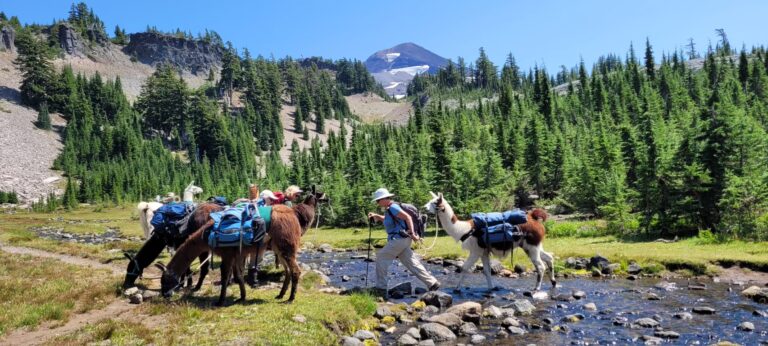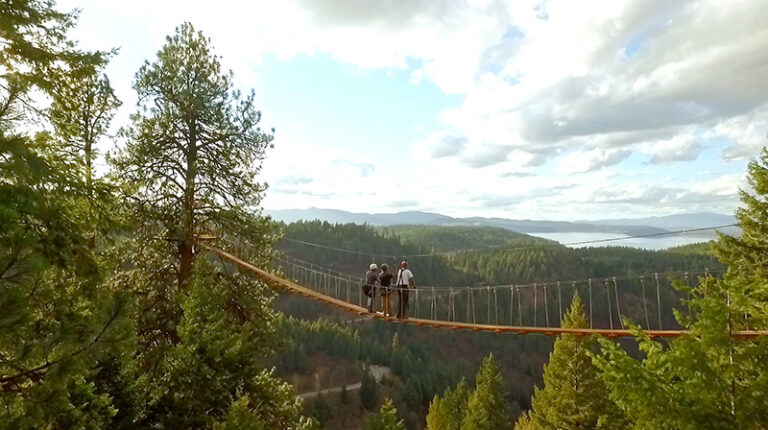Nothing in nature hurries. A doe may bolt when she hears us bumbling down a trail; sparrows may dart from branch to branch, may launch to air at the approach of a stray cat. Even tamarack needles may seem to go golden overnight.—but they do not hurry. They act as they do in accordance with science, necessity, survival. They do not hurry. We do.
Consider this: Haste comes from the Old English “haifst,” which meant “violent.”
Early last summer, my wife and I backpacked on a nearby river trail. The tread is high above the water, necessitating a drop down to the shoreline to find campsites. With dusk approaching, we followed an angler’s trail to a meadowy flat beside the water, ditched our packs, and I, familiar with the area from many fishing trips, headed up the shoreline to see if anyone had claimed a nearby campsite at one of the deep corner pools. Off I went at a trot, scampering along a game trail that was easy to follow, even through thick growth. I hopped over a deadfall, pushed aside a small alder, and screamed when something big and brown and loud snorted and smacked me in the shoulder with a huge snout. I tucked and rolled, and the animal (I could now see that it was a moose) surged past me. Getting back to my feet, I hopped to my left to get a sapling between us. The moose hesitated, hackles sticking straight up; I glanced upstream and saw a young calf crossing the river; the mother came at me again, literally stomping over the small tree. I backpedaled to the shore and leapt into the cold, thigh-deep water. She edged up to the bank, snorted, hackles spiked, and edged along the bank as I half-floated, half-ran downstream—no longer hurrying but moving with the deliberate swiftness of survival.
One of my favorite poems is Theodore Roethke’s “The Waking.” The first line goes like this: “I wake to sleep and take my waking slow.” Notice the rhymes that stitch the line together; notice the strange paradox of the opening phrase—what Cid Corman (another poet) called livingdying, the continuum in which we live—every moment of life a moment closer to death. A cliché, maybe. But notice, most importantly, that the speaker emphasizes taking his “waking slow”—if only it were easy.
Even after being smashed about by a cow moose, how hard that lesson is to learn. Backpacking in the Frank Church later in the summer, I awaited my brothers’ return to camp; they had headed upriver to fish a few holes, and we were all to rendezvous at our tents and then head downstream to fish together. It was hot. A plane buzzed overhead. Time passed. I wanted to fish more. They always seemed to take so long. I waited and became more and more impatient and decided that I should go look for them. I trotted (!) down the shore toward a high ridge in the bank where I could see upstream and gauge when they would get back to camp. They must be near, they must be close, they always took so long, I thought, as I jogged and then, suddenly, jumped like I have never jumped before—the sound of a rattler launching me to avoid its coiled strike.
Another line in Roethke’s poem goes, “We think by feeling. What is there to know,” and although I understand the sentiment, I think Roethke idealizes—if only it were so easy to think by feeling, by intuition, by the rites of necessity rather than the schemes of possibility. If we were to live in that confidence of action, that deliberate precision, then, perhaps, we would take our waking more slowly and be less driven by the frenetic nervousness that is haste. Perhaps—always perhaps.
In Glacier at the end of summer. Backcountry. We’d gone on a day hike up to an alpine lake and had picked a big bag of huckleberries to mix with the freeze-dried pudding set aside for dessert. Up at the lake, we’d spent an hour through binoculars watching a grizzly grouse on the far side of the lake, mesmerized by its steady movement through the rocks, digging after a pika, uprooting glacial lilies, clearing off clumps of berries with a single swath of its claws before its snout turned upward into the wind and caught our scent (the breeze shifted). What followed was a spectacular privilege: to see the great animal turn and move quickly but deliberately over scree, up small cliffs, along the steep slope and toward an untrailed drainage where humans rarely ventured.
We headed back to our base camp. After an hour on the trail, the cooking area for camp was in sight. I hustled ahead, the excitement of the grizzly having faded into the plodding of rehiking familiar terrain. Suddenly, my wife said, “Stop,” and I looked up to see a sow and her two cubs lumbering toward me—barely thirty feet away. I stopped, backed up; they stopped, smelled. They were black bears, large but not huge. I backed steadily away; they kept coming up the trail. I fumbled at my waist-holster for my bear spray, couldn’t quite get it out, pulled harder, got the canister in hand, hastily yanked at the safety and sprayed myself right in the kidney area. Ouch. The bears paused, sniffed in my direction, and headed off the path into the pines.
What a summer. “Out there” (in the woods, waist-deep wading and casting, walking high ridgeline trails through snow) or “back here” at home (washing dishes, mowing the grass, talking to a friend), we can do violence when haste propels us. The moose, rattler, and bears were unknowing instructors: Whether I learned any lessons—that’s a much harder question to answer.













